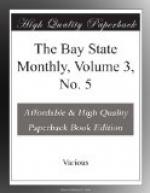Barclay said in his report to the British Admiralty, that when Perry boarded the Niagara, that vessel was fresh in action. Up to that time she had been beyond the effective reach of the enemy’s guns, but under her new commander there was no halting in her course as she bore down to break and pass through the enemy’s ranks. Every brace and bowline were taut, and every man on board, apprised of what was expected of him, was soon at his post of duty; each, as he took his position, cast a hasty glance at Perry’s battle flag then flying from the masthead of the Niagara, and as he took in the dying words of the noble Lawrence, formed a solemn resolve to obey their mandate and made that resolve a sacrament.
As she went into action, the Niagara belched forth a broadside at the Detroit and the Queen Charlotte, then a broadside at the Chippawa, the Lady Provost and the Hunter. These broadsides were repeated in rapid succession with terrific effect. The other American vessels, now in action, whose crews were inspired by the daring of their fleet commander, imitated his example and the combined result was such as Britons could not endure. The eagles of victory soon perched in triumph on the mastheads of the American fleet, and Perry had won the battle which James Madison, then President, said “had never been surpassed in lustre, however much it may have been surpassed in magnitude.”
After the action, Perry returned to the Lawrence, changed the dress of a common sailor for an undress uniform, that he might appropriately receive the surrender of the enemy on board the vessel that had been in the hardest of the fight and had suffered most from it; and that the remnant of her gallant crew might witness the submission of the foe which had caused their sufferings.
That relief from apprehension for the safety of the fleet might be given to General Harrison and the settlers on the widely extended domain about the Lake, Perry penned and dispatched to that general a hasty note, in words familiar, and destined to be immortal, telling him “We have met the enemy and they are ours,” and another like hasty note, to the Secretary of the Navy, informing that officer that, “It has pleased the Almighty to give to the arms of the United States a signal victory over their enemies on this lake. The British squadron consisting of two ships, two brigs, one schooner and one sloop, have this moment surrendered to the force under my command after a sharp conflict.” There is nothing of the valor of the pen or of the exaggeration of self from the ink horn in this concise and expressive note.
The enemy’s surrender was gracefully received. Perry soon visited the wounded Barclay, and tendered him every service that it was in his power to render, and every possible attention was given to the wounded of both fleets. Then came the roll-call to see who had answered the final summons to duty on the field of honor, who had received marks of courage in the fight, and who had gone through the dreadful ordeal of battle unscathed. It was then that the tears of sorrow mingled with the exultations of victory which soon were to be shouted along the line of every highway and by-way, from hamlet to village, from village to town, and from town to city, throughout the land.




